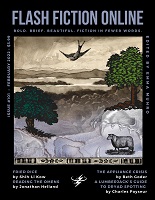 Flash Fiction Online #101, February 2022
Flash Fiction Online #101, February 2022
“Fried Rice” by Shih-Li Kow
“Reading the Omens” by Jonathan Helland
“The Appliance Crisis” by Beth Goder
Reviewed by Tara Grímravn
Along with two reprints, this month’s Flash Fiction Online follows the usual trend for February reads—love. And not just the romantic kind, either. In these stories, love in all of its various guises makes an appearance.
“Fried Rice” by Shih-Li Kow
An unnamed narrator’s father isn’t getting along with their CookBot. No matter how many times dad tells it to make fried rice, it just doesn’t turn out the way mom would have made it, despite the flavor profile being a perfect match. Deep down, though, dad’s anger isn’t about the rice—it’s about mom’s death. The question is how to help him let go and move on.
Food plays such an important role in human life. It links us to our heritage, forming a large part of our identity. Food also lets us bond with family and friends over carefully prepared meals, and for many, feeding our loved ones shows them that we care. That’s really what is at the heart of this story. As humanity moves forward, implementing increasingly advanced technologies, what happens when we start to replace those things that once brought us comfort with something as impersonal as a robot chef?
For me, it’s not the most entertaining story, reading more like a slightly futuristic contemporary piece than anything else. There’s no real action, no fast pacing or danger—just a family and their robot chef. But for those interested in exploring the emotional aspects of food and the role it plays in our relationships, this brief story is worth a read.
“Reading the Omens” by Jonathan Helland
Signs and omens inform a young seer that war will soon be at his door. In the next valley, the woman he loves, herself a seeress, lives in the village where they grew up together. With the growing conflict threatening to separate them for good, he must find a way to tell her that he loves her.
Helland presents an interesting romantic tale that examines which is more important: love or duty? The story is touching and certainly tugs at the heartstrings. Still, I have to wonder why the solution hinted at in the final sentence isn’t the first one to come to his mind. It seems like it would have been the logical first thought. There is no real deliberation on the situation, no consideration of alternative or solutions, no weighing of pros and cons, which one would think would be the first step to an issue as large as having to choose between one’s loved ones and permanent separation.
“The Appliance Crisis” by Beth Goder
It’s not often that a magical item imprints on someone. But when it happens, it is a lot of responsibility. Unfortunately for our narrator, her imprinted magical pain-in-the-rear is a rather temperamental toaster that usually produces everything except toast. Just now, it’s spat out a bunch of eggplants and melted candy. To make matters worse, her long-time love interest, Ernest, just knocked on the door. How is she going to explain the mess?
Goder’s story is a cute tale about a high-school crush. While it’s built around a relatively common trope, the rest of the plot is certainly original. That said, it does leave me with a few questions, such as if no one believes the narrator about the toaster being magical and it requires a certain amount of bread each week to keep it quiet, how does she explain the bread being used up? How much bread does the toaster require? Wouldn’t her mother notice an increase in bread consumption? And how does one come across such an item without anyone else in the family knowing about its tendencies? The ending left me with similar questions. All in all, it’s an alright story, just with a few holes.